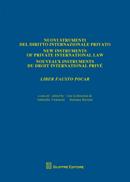Many thanks to Professor Laura Carballo (Santiago de Compostela University, Spain), who has asked me to upload this brief comment on the ECJ judgment following Veronika Gaertner‘s post ECJ: Judgment on International Jurisdiction in Respect of Actions to set a Transaction aside by Virtue of Insolvency.
By Judgement of 12th of February 2009, the ECJ has addressed the issue of international jurisdiction for claims “which are delivered directly on the basis of the insolvency proceedings and are closely connected with such proceedings”. These terms are contained in Recital 6 of Regulation (EC) Nr. 1346/2000, on insolvency proceedings; its Article 25.1 repeats the same definition, stating that judgments delivered in such kind of claims are to be recognized according to Articles 31 to 51, with the exception of Article 34(2), of the Brussels I Convention (now Articles 32 to 52, with the exception of Article 45.1, of the Brussels I Regulation). But Regulation (EC) Nr. 1346/2000 does not say anything about international jurisdiction rules for such claims, i.e. about a rule on vis attractiva concursus.
The issue was directly addressed by 1970 and 1980 Drafts of an European instrument on insolvency proceedings, both setting out which claims closely connected with insolvency proceedings must be concentrated before the forum concursus. Because of these statements, the silence of Regulation (EC) Nr. 1346/2000 was understood as an acknowledgment of the application of national jurisdiction rules. But this resulted to be a dangerous interpretation, because, as mentioned, Article 25 of this Regulation grants a privileged recognition system, without examination on the grounds of international jurisdiction; therefore, Member States should enforce all judgements, even when delivered by an exorbitant forum. Besides, application of national jurisdiction rules gives rise to negative conflicts of jurisdiction, because of the many understandings of the vis attractiva concursus rule by Member States. This is the outcome in the case underlying the recent EJC Judgement: On 14 March 2002, Frick Teppichboden Supermärkte GmbH, which has its seat in Germany, transferred EUR 50 000 to Deko Marty Belgium NV, a company with its seat in Belgium. Frick made an application for opening an insolvency proceeding the 15th March of 2002 and the named liquidator brought an action to set the transaction aside. He tried it first in Belgium, but Belgian Law establishes a vis attractiva concursus for avoidance proceedings and sent the matter to Germany. On the contrary, Germany places this action by the courts of the defendant’s domicile, in this case Belgium. In the end, the German Bundesgerichtshof posed the two following questions to the ECJ, framing the issue in terms of European Regulations’ scope of application:
“(1) Do the courts of the Member State within the territory of which insolvency proceedings regarding the debtor’s assets have been opened have international jurisdiction under Regulation [No 1346/2000] in respect of an action in the context of the insolvency to set a transaction aside that is brought against a person whose registered office is in another Member State?
(2) If the first question is to be answered in the negative:
Does an action in the context of the insolvency to set a transaction aside fall within Article 1(2)(b) of Regulation [No 44/2001]?”
The EJC gives a positive answer to the first question:
“Article 3(1) of Council Regulation (EC) No 1346/2000 of 29 May 2000 on insolvency proceedings must be interpreted as meaning that the courts of the Member State within the territory of which insolvency proceedings have been opened have jurisdiction to decide an action to set a transaction aside by virtue of insolvency that is brought against a person whose registered office is in another Member State”.
The EJC’s answer is a logic one, given the fact that the definition stated by Recital 6 and Article 25.1,II of Regulation (EC) Nr. 1346/2000 comes from Case 133/78 Gourdain [1979] ECR 733, paragraph 4, a judgement delivered on the interpretation of Article 1(2)(b) of the Brussels I Convention, where it was decided that the so defined claims do not fall within the scope of application of the Convention, now Brussels I Regulation, in the case a French action against the de facto manager of an insolvent company. Therefore, this judgement is not a surprise, but a step forward in bringing juridical security to insolvency proceedings in the European Union. As a result of this answer, the question of which claims “are delivered directly on the basis of the insolvency proceedings and are closely connected with such proceedings” and, therefore, are to be located before the courts where insolvency proceedings are conducted, is now open and should give rise to an autonomous interpretation by the ECJ. Gourdain and Deko Marty Belgium give just some clues, but the issue is far from being closed. For now, this judgement makes it clear that avoidance proceedings are one of them, but it is going to be more difficult to decide other claims, such as liability claims against managers and administrators, or claims arising from the impact of insolvency in running contracts.

 The first issue of French Journal du Droit International (also known as Clunet) will shortly be released. It contains several articles dealing with conflict issues.
The first issue of French Journal du Droit International (also known as Clunet) will shortly be released. It contains several articles dealing with conflict issues.